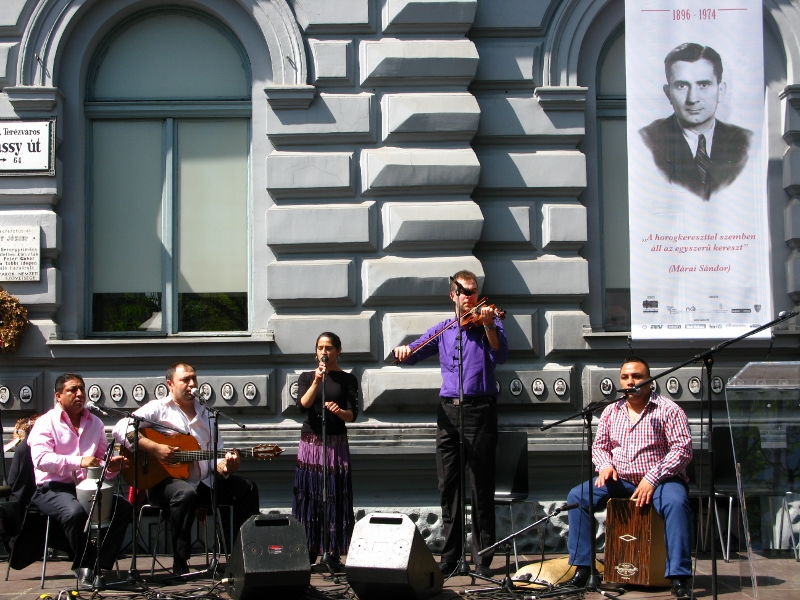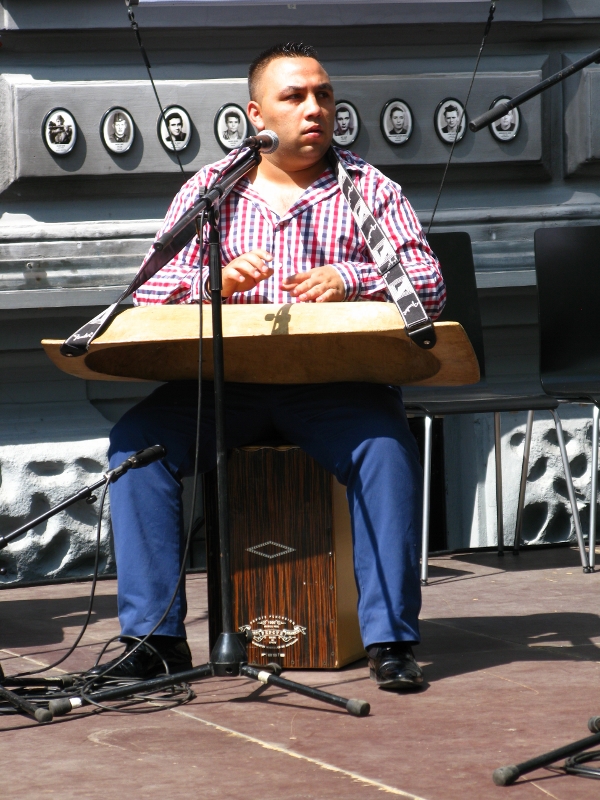Of the 11 million said to have perished in the Holocaust, five million were not Jewish: they were Roma, Jehovah’s Witnesses, university professors from the Polish city of Lviv, the disabled, the mentally ill, homosexual, political prisoners, artists, 500 teenagers of mixed African and German parentage (the offspring of French colonial troops stationed in the Rhineland in the early 1920s) – in short anyone who wasn’t deemed fit to be part of Hitler’s Germany.
Walking past the House of Terror museum on Andrassy út on Sunday, I noticed a small crowd and stopped to see what was going on. A stage had been set up outside, underneath the framed photographs of Arrow Cross victims that line the walls of the building. Two groups of musicians sat side by side.
On the left was a group of Romani musicians, running through a sound check. One played what looked like a milk churn, another what looked like a small wooden bath. I was struck immediately by the venue – the street outside the building where many of their predecessors met their end. An estimated 28,000 Hungarian Roma were killed as part of the Porajmos (Romani Holocaust) which is said to have claimed the lives of as many as 500,000.
To their right was a larger group, all wearing sweatshirts emblazoned with the words Párafónia Zenekar. The band was set up about ten years ago and now has twelve members who collectively play thirteen different instruments, and most of them have their own musical assistant. They play at home and abroad – Germany, the Netherlands , Austria, Belgium , Poland, Vojvodina, and Transylvania – and are truly amazing to watch and listen to. Involved with FECO – the First European Colour Orchestra – an orchestra of people with intellectual and physical disabilities founded in January 2002 – Párafónia Zenekar is living testimony to what might have been lost, had Hitler had his way.
The mass sterilisation programmes that were a prelude to Hitler’s T-4 Euthanasia programme saw the deaths of thousands mentally ill and disabled people. Institutions were emptied as their patients were gassed. Adults and children alike.
The mind boggles.
Later that afternoon, I joined thousands of others who took to the streets to mark Holocaust Remembrance Day and yet it was those few minutes of music by those two particular groups in that particular setting that drove home to me what was done 70 years ago and what might have been lost.
Share this:
- Click to share on X (Opens in new window) X
- Click to share on Facebook (Opens in new window) Facebook
- Click to share on Pinterest (Opens in new window) Pinterest
- Click to share on LinkedIn (Opens in new window) LinkedIn
- Click to share on Reddit (Opens in new window) Reddit
- Click to share on WhatsApp (Opens in new window) WhatsApp
- Click to share on Pocket (Opens in new window) Pocket
- Click to share on Telegram (Opens in new window) Telegram
- Click to email a link to a friend (Opens in new window) Email









0 responses